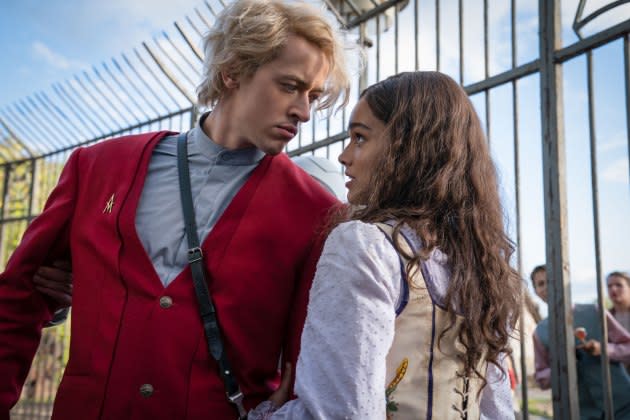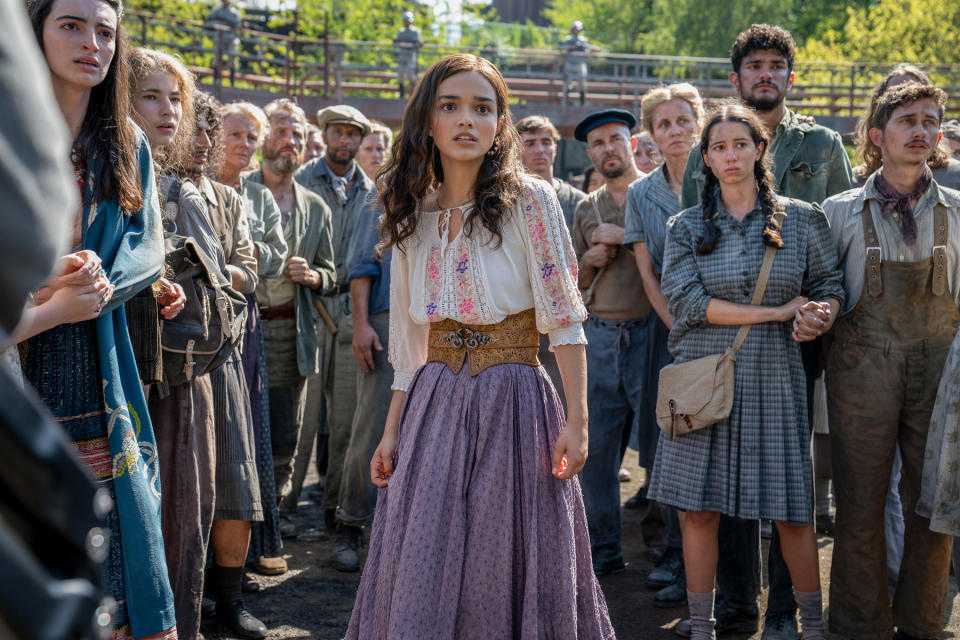‘The Hunger Games: The Ballad of Songbirds & Snakes’ Is One Stuffed (But Satisfying) Prequel
- Oops!Something went wrong.Please try again later.

Long before there was a Katniss Everdeen, future victor of the Hunger Games and Panem’s No. 1 revolutionary icon, there was Lucy Gray Baird — a young woman who also hailed from District 12 and found herself recruited as a tribute in a fascist world’s annual entertainment death march. She had a beautiful voice, a steel backbone, and enough wits to have the odds ever in her favor for the 10th edition of the Hunger Games. They were a little different back then — no one had figured out how to employ genetically modified wasps or mandrills yet, and much of the action was relegated to an arena fit for gladiators instead of a clockwork island. But the blueprint for future tournaments was basically in place: 24 kids, two per district, only one goes home alive.
This would be the first year that the games would assign mentors to each of the tributes, however. And Baird would get lucky in terms of who helped her navigate this kid-kill-kid competition: a handsome, empathetic 19-year-old military cadet named Coriolanus Snow….
More from Rolling Stone
These names either mean something enough to make you borderline hysterical with excitement, or conjure huge cartoon question marks above your head. Like so many YA-lit trilogies before it, Suzanne Collins’ Hunger Games books managed to turn a rabid readership into both a mega-movie series and a mainstream pop-cultural phenomenon. Even your mom knew who Katniss Everdeen was. And like a lot of big-screen franchises, it quickly became caught up in its own ever-expanding lore and began to literally and figuratively lose the plot. It was still a given that, when Collins published a prequel novel in 2020, Hollywood would come calling. But the “last” movie — The Hunger Games: Mockingjay–Part 2 — hit theaters in 2015. That’s almost a decade in human years, over a century in dog years, and several millennia in franchise years. How much currency did this I.P. still have? And in a world where new cinematic universes seem to big-bang into existence every few months, did fans still have room for the dystopian pop-kingdom of Panem?
So thank Plutarch Heavensbee that The Hunger Games: The Ballad of Songbirds & Snakes at least nails the teen angst, the apocalypse-soon vibe, and the giddy over-the-top gestures of that original four-movie run. Set some 60 years before Katniss volunteered as tribute, this “chapter zero” entry returns us to the familiar, if momentarily forgotten world of Collins’ imaginary totalitarian nation. Francis Lawrence, who directed every Hunger Games film except the first one, is back behind the camera. The plebeians still look like they stepped out of a Dorothea Lange portfolio. The patricians still dress like they just left the Met Gala to compete on RuPaul’s Drag Race. The media is still toxic and obnoxious, because art still imitates life. The games still must go on. Only the incredibly florid, practically unpronounceable names have changed.
Except for Coriolanus Snow, that is. Forget about Donald Sutherland’s wisened, bearded, elitist villain of the original four-film trilogy. Here’s the young, hot, and not-yet-corrupted version of the future president, courtesy of Billy the Kid’s Tom Blyth. Snow has seen the “dark days” of the districts’ revolt tear his family apart; the promise he’s shown at the Academy has impressed several of the higher-ups, however. Notably Dr. Volumnia Gaul (Viola Davis), the head gamemaker and chief-giggling-sociopath-in-charge. Should Snow’s ward in the games win, he’ll be in line for a scholarship that will set him, his ailing grandmother (Fionnula Flanagan), and his cousin Tigris (Euphoria’s Hunter Schafer) up for life. When he finds out that he’s mentoring District 12’s Lucy Gray Baird (Rachel Zegler), it appears that he’s been dealt a bum hand. Then he sees her keep her cool during a volatile “Reaping” ceremony and sing a folksy dirge to the camera. She can win over a crowd. He can work with this.

Having set its chess pieces on their proper squares, Ballad tucks into the usual business of moving them about, colliding them into each other, and systematically knocking them off the board. There’s a friend of Snow’s, Sejanus Plinth (Josh Andrés Rivera), who represents both comradeship and moral conflict. There are more villains to jeer, namely the school’s boozed-up dean Casca Highbottom (Peter Dinklage), who has an ax to grind with Coriolanus, and Lucretius Flickerman (Jason Schwartzman), a TV personality who has an ax to grind with people who don’t know who he is. (Both gents continue the grand Hunger Games tradition of awesome facial hair, with Schwartzman’s pencil-thin mustache paying homage to either John Waters or this.) There’s a big ol’ tank of venomous snakes that pays off big-time. There’s talk of fascism and rebellion and the haves screwing over the have-nots, an ongoing franchise preoccupation that only seems more urgent right now. There are teens and tweens who meet particularly grisly ends, reminding you that even during the young-adult sci-fi boom of the past 15 years, this series has always been particularly brutal and pitiless in imagining a world where underage death doubles as mass distraction and high-ratings reality-TV bliss.
That’s also a Hunger Games staple, of course, and this imperfect yet surprising prequel knows that even those who haven’t read the book(s) will want that itch scratched. But at is dark heart, The Ballad of Songbooks & Snakes is really about the slow, methodical making of a monster. This is another origin story of a villain, given the same treatment that Darth Vader, Hannibal Lecter, and many, many other recognizable big bads of past pop-culture touchstones. Whether anybody was dying to know how Coriolanus Snow curdled into the cruel tyrant of the Katniss era or not, this is what we get here, nestled among the Easter eggs and callbacks.
Luckily, Blyth is savvy enough to not lean into the mustache-twirling — that’s Schwartzman’s job, after all — or the telegraphing of horrors to come. Like the movie itself, the performance doesn’t need to reinvent the wheel in terms of how a good man goes evil. But both the actor and Ballad seem to respect the fans and the franchise, not just in terms of investment but in building out things sideways instead of forward. And in this age of cheap cash-ins and cinematic universes increasingly tying themselves into Gordian knots, that’s the best you can hope for.
Best of Rolling Stone

